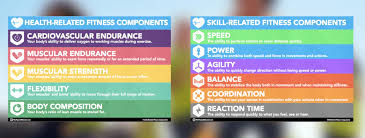WHAT DOES FITNESS MEAN TO YOU?
- Chiamaka Ikpeze B.MR(pt)

- Oct 5, 2020
- 4 min read

Fitness is defined as the state of being in optimal health. Being fit not only means physical health, but emotional and mental health, too. It defines every aspect of your health. For the purpose of this article I’ll be discussing physical fitness.
“Physical fitness is a state of health and well-being and, more specifically, the ability to perform aspects of sports, occupations and daily activities.” – Wikipedia.
However, one of my best ways to describe Physical Fitness is, “your body’s ability to work together to ensure optimal daily performance”. In other words, fitness is your body’s ability to get you through every day with ease.
There are 11 components of fitness, these are divided into :
Health related components and,
Skill related components.

When I first meet a fitness client, the first question I ask is “what does fitness mean to you?” right after introduction and “can I offer you something?” of course (am not that socially awkward). And 8 out of 10 times most people describe fitness in terms of body composition alone. While a lower percentage is desirable, Fitness goes beyond being slim alone. Its important for us to understand how important the other 10 components of fitness are, and how they apply to our daily lives.
CARDIOVASCULAR ENDURANCE:
This relates to how effectively your body uses oxygen. In simpler terms this is why Tina can climb stairs like a pro without breaking a sweat and Bisi can walk from Lagos to Abuja to greet Buhari and you can’t climb to your second floor apartment without feeling like your having a heart attack.
Cardiovascular fitness has absolutely nothing to do with your body size or age.
MUSCULAR STRENGTH:
This is your muscles ability to exert maximum force in one effort. This is the peak energy your muscles can muster to a single burst of activity.
MUSCULAR ENDURANCE:
This is the ability for your muscles to exert force repeatedly for an extended period of activity.
In simpler terms, muscular strength is why you can lift a heavy child up or lift your box up to your bed. But endurance is the reason why the mother of that child can carry them for 30 minutes without cramps and you can’t. Muscular endurance explains why your pastor or lecturer can stand to deliver 30 minutes to one hour lecture and you can’t even stand for 10 minutes straight without looking for a pillar to lean on.
FLEXIBILITY:
This is simply how far your body can stretch. How can some people can stretch to touch the middle of their back and you can’t even hook your bra straps at the back. Or why Chika can do splits and you can’t even do “wider, wider”. This also explains why your whole body is paining you after he has put you in “7 positions in 7 minutes” and modeling for “kama sutra”.
AGILITY:
This is the ability to change direction quickly without losing speed and power. This is the component sports players and dancers need. When dancing the ability to move fluidly and with ease is agility.
CO-ORDINATION:
This is the ability to move all the parts of your body in sync with your senses. You need co-ordination to play sports, dance, even in sewing to move the pedals and cloth in tandem. To move your arms and legs when swimming, or dancing or even running. Or even to quickly reverse when you see FRSC up ahead. These all takes co-ordination.
SPEED:
This is your ability to perform actions quickly or cover distance. How fast can you skip, run, walk, dance, write or even type. These all have to do with speed.
POWER:
This is the ability to combine speed and force in one movement. How hard and how fast can you do it. Power explains how porn starts can go as hard and as fast as you want and Emeka will need malt and milk after such a performance.
BALANCE:
This is the ability to maintain the body’s position both in movement and maintaining position. This is why my baby cousin can use a hover board and my sister cant. Or why I can’t balance on a bike. Balance is what skateboarder and ice dancers need along with agility, speed etc.
REACTION TIME:
The ability to respond quickly, to what you see, feel or hear. When you see a car coming, how quickly do you dive out of the way? When a bottle is about to fall from your table, how quickly do you dive for kit. How quickly does a goal keeper react to change in direction by the striker?
BODY COMPOSITION:
This is your body’s ratio of lean muscles to fat. Body composition is the component that weight loss gain and muscle bulking is concerned with. And this is the component most fitness trainer or weight loss coaches are most concerned about.
Skills are related to power, agility, co-ordination, speed, balance and reaction time.
Fitness goes beyond how you look, it involves how you move and react to everyday activity. From how easily you walk to how far you can carry your groceries or even being able to change a tire and fetch water. Fitness affects everyday activities and understanding the components of fitness is crucial to creating and effective fitness plan.
So, what does fitness mean to you? Comment below with your answers and let me know.
Chiamaka Ikpeze B.MR(PT)
Director and lead content creator,
Titan Physical therapy and fitness.







Comments